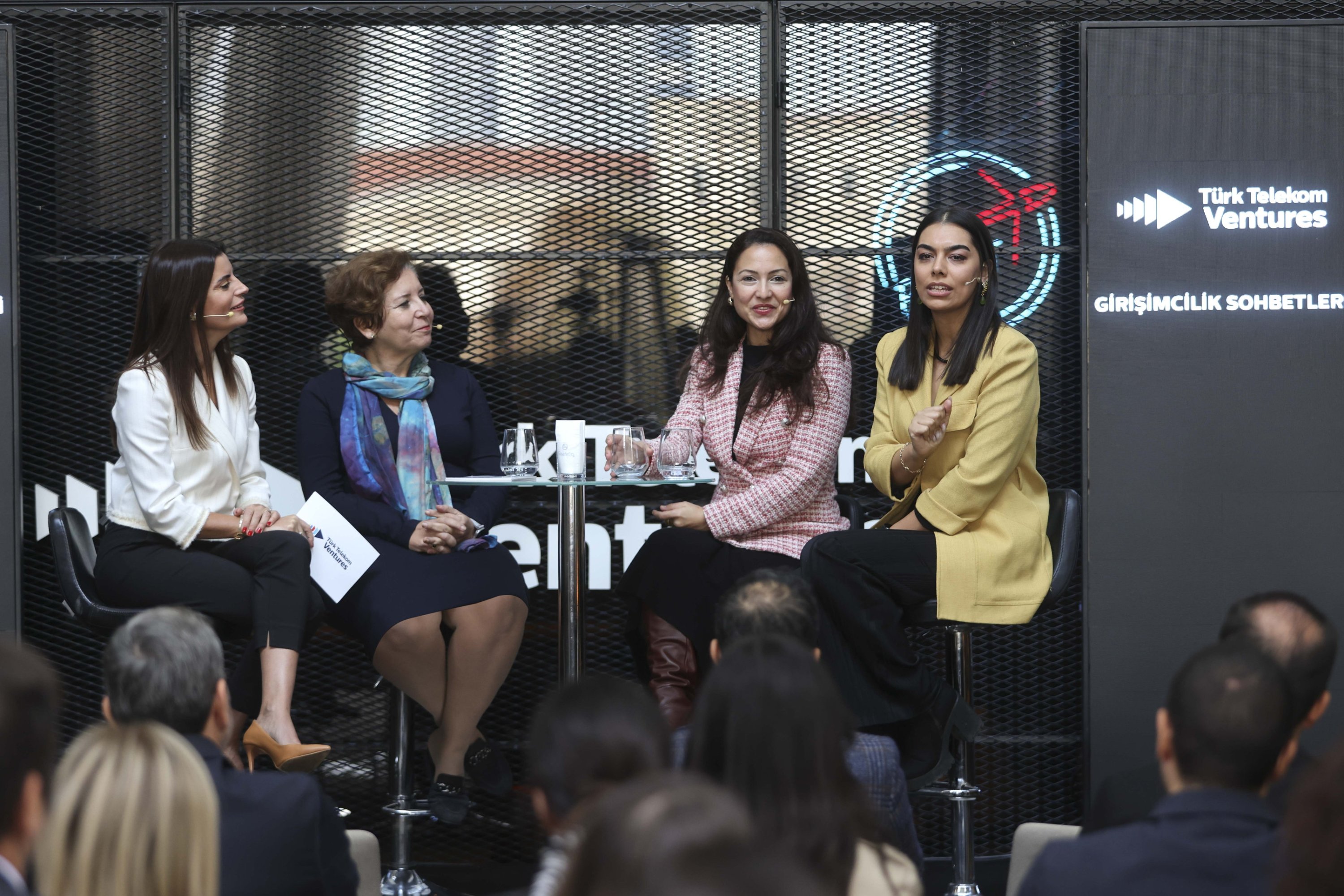© Turkuvaz Haberleşme ve Yayıncılık 2026
Used as a stage to debate the ideas of the future and encouraged by record participation, this year's edition of Europe's premier technology gathering, Web Summit, shed light on the booming virtual Youtuber – or VTuber – scene.
Dominated by Japan, the appeal of VTubers helped transform it into a thriving industry with a loyal audience where top accounts can rake in millions of dollars a year.
These online content creators use virtual avatars or characters, often created using computer graphics or animation technology, to represent themselves on platforms like YouTube and sing, dance and interact with fans.
Jia Shen, CEO of AKA Virtual, revealed that only 10% of the top VTubers are actual real human beings. She emphasized that virtual YouTube hosts have become influential figures in both the real and virtual worlds, engaging audiences through lower-tier and highly interactive live broadcasts.
“They’re some of the most-subbed and superchatted livestream influencers of both the real world and virtual,” said Shen.
Japan is a content pioneer, with gaming at the forefront. This is particularly witnessed in the world of VTubers, Japan’s virtual gaming YouTube streamers who are forging a new frontier by bringing gaming characters to life.
According to Shen, this is a trend that is also beginning to catch on in the West, particularly as younger audiences gravitate towards self-curation of their content diets on TikTok, YouTube and Twitch.
The evolving technology also opens avenues for brands to bring VTube characters into the real world, leveraging them in marketing and brand-centric content creation.
Jia's company has entered a partnership with Sega to bring characters like Sonic and Street Fighters beyond consoles and into the real world.
VTubers in Japan leverage virtual avatars to create content and have gained immense popularity. They produce music videos, game reviews, draw content, conduct live broadcasts and create sponsored video content.
Most of the VTubers conduct live streams using the YouTube "Super Chat" feature, a gift system, and employ real-time motion capture software. VTubers have become widely recognized, transforming into a multi-million-dollar industry.
Riku Tazumi, co-founder of the VTuber management company Nijisanji, achieved a net worth of $1.1 billion just four months after the company went public, thanks to its rapid growth.
In February this year, Tokyo appointed three VTubers as tourism ambassadors. Three virtual influencers from the Hololive collective, Mori Calliope, Gawr Gura and Sakura Miko, conducted virtual tours around Tokyo as part of a campaign introducing the city's first tourism ambassador group.
This year has also seen an increase in sponsored content on VTubers' social media channels. The VTuber audience is broad and niche, making it an excellent platform to target subculture demographics.
Web Summit, which first started in Dublin 14 years ago with 150 people, has transformed into a global gathering that today hosts at least 70,000 innovators, creative minds, technology enthusiasts, policymakers and thought leaders in Lisbon. Let's delve into the highlights of Web Summit 2023.
Can discussions within a giant tent shape our lives? Can an idea that seems intolerable now evolve into a global trend? History is replete with such examples. Imagine a tent that brings together artists, scientists, politicians, technology professionals and entrepreneurs, discussing every topic in a simple and straightforward manner, breaking free from technological jargon. This is the essence of Web Summit, where the idea of uniting innovative minds shaping human culture and business practices has garnered significant attention worldwide.
The initial discussions at this year’s edition of Web Summit centered around the resignation of its founder, Paddy Cosgrave. A single tweet stressing Israel was committing war crimes in Palestine led to major tech companies withdrawing from the event, eventually resulting in Cosgrave's resignation. Despite a low-key start, the focus soon shifted to business as usual.
Cosgrave, the outspoken former CEO and brainchild behind the Web Summit, never backed away from addressing controversial topics each year. After his resignation, the new CEO, Catherine Maher, stated that Cosgrave's personal comments had cast a shadow over the event's purpose, leading to his departure.

This year’s edition saw the participation of 34 ventures from Türkiye, backed by the Presidential Investment Office, Foreign Economic Relations Board (DEİK) and development agencies.
Maher emphasized the event's growth since its humble beginnings in Dublin 14 years ago.
“Since its inception 14 years ago – 150 people in a cramped lecture room in Dublin – Web Summit has been about bringing people together: innovators, investors, policy-makers, thinkers, business leaders and all those who will shape the world of tomorrow. Every year, it’s your participation that fulfills this promise,” she said.
The event, born in Dublin and reaching Lisbon, Rio in Brazil and next year Doha, Qatar, continues to expand. It boasted a 43% female participation rate this year and featured individuals from the realms of business, art and sports on its stages.
The technology world's most discussed topic, artificial intelligence (AI), was extensively debated this year, addressing ethical and legal aspects. Scientists argued that independent innovation could be adversely affected by the European Union's AI laws, advocating for the concept of "Unauthorized Innovation."
They also shed light on how AI may be used as a pretext by employers to worsen working conditions rather than replacing human workers.
Web Summit wants to be a place where the smallest startups and the biggest names stand shoulder to shoulder in the same areas, connecting through cooperation and challenging the status quo. A place that sees technology not only as an industry but as a force that transforms business, politics and society.
Concerns were raised about AI causing job loss, but the potential for AI to assist rather than hinder workers was explored. Examples, such as AI's effectiveness in developing the COVID-19 vaccine, were highlighted. Melanie Nakagawa, Microsoft's sustainability chief, discussed how AI could provide solutions to the climate crisis, contributing to the acceleration of creating climate solutions for a net-zero world.
How can you tell people they will be successful without convincing them that the transformation will benefit them? That's why every digital transformation idea requires an effort to persuade people. Let's not limit this statement to just convincing the boss. A successful transformation happens by pulling all affected individuals into the project.
The final two days of the Web Summit saw hundreds of speeches delivered on multiple stages. From artificial intelligence and deep technology to marketing and content creation, there has been something for everyone.
Artificial intelligence is a source of concern for many workers; many fear that automation will lead to layoffs. So, is it possible for artificial intelligence to assist rather than hinder workers? Artificial intelligence has proven its effectiveness in various areas, including the development of the COVID-19 vaccine. Can it be used to save the planet?
Microsoft Chief Sustainability Officer Melanie Nakagawa offered a vision of the near future, one in which AI can help us solve the climate crisis, contributing to accelerating the development of solutions needed to achieve a net-zero world.
One of Türkiye’s leading telecommunications and technology companies, TürkTelekom continues its commitment to supporting innovative entrepreneurial ideas and adding value to the entrepreneurial ecosystem.
In pursuit of this goal, the company, as the main supporter, organized a special event on Nov. 19, Women's Entrepreneurship Day, at the Türk Telekom Ventures Entrepreneurship Center located at the Atatürk Cultural Center, the intersection of technology, culture and arts.
Muhammed Özhan, the general manager of TT Ventures, expressed the company's dedication to advancing innovative ideas in the entrepreneurial ecosystem.

"We are working to facilitate the progression of innovative ideas in the entrepreneurship ecosystem and to propel Türkiye forward in this field. We believe that the TT Ventures Entrepreneurship Center, opened at the Atatürk Cultural Center with Türk Telekom as the main supporter, will be a source of inspirational ideas in the very near future,” said Özhan.
“We are actively supporting the entrepreneurial ecosystem in various domains and were delighted to listen to the inspiring stories of women in the entrepreneurial ecosystem on World Women's Entrepreneurship Day," he noted.
Türk Telekom is dedicated to strengthening the entrepreneurial ecosystem by supporting innovative startup ideas with technological and social means. Speaking at the opening of the "World Women's Entrepreneurship Day Meeting," part of the TT Ventures Entrepreneurship Talks, Özhan highlighted their commitment to guiding and investing in local startups focused on technology in various fields.
“We guide and invest in local startups focusing on technology in various fields, ranging from health to energy, education and AI-supported business solutions, contributing to the entrepreneurial ecosystem. We believe that groundbreaking ideas for the future will emerge at the TT Ventures Entrepreneurship Center, whose opening we recently celebrated at the Atatürk Cultural Center, with Türk Telekom as the main supporter,” he noted.
Özhan also mentioned ongoing and future events at the Türk Telekom Ventures Entrepreneurship Center, where he says expert guests address different topics related to the entrepreneurial ecosystem. He said the center aims to continue organizing special events to further engage and contribute to the entrepreneurial community.
The "World Women's Entrepreneurship Day Meeting" featured a session titled "Living Beyond Dreams," which saw investor and social entrepreneur Ebru Dorman provide insights into the entrepreneurial ecosystem in Türkiye and share the criteria for successful startups from an investor's perspective.
The second session featured the success stories and journeys of Aytül Erçil, co-founder and co-CEO of Vispera, along with Ceren Süngü Kalpaklıoğlu, the founder of Pabbler, a graduate of TT Ventures' startup acceleration program PILOT, and Gökten Doğan, who developed its brand called Büyük Dedemin Balları through trainings and grants extended through the Digital Makes Life Easier project.
